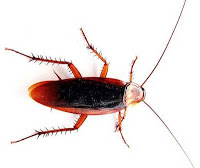

| Visitors Now: | |
| Total Visits: | |
| Total Stories: |

| Story Views | |
| Now: | |
| Last Hour: | |
| Last 24 Hours: | |
| Total: | |
Cute and fuzzy….cockroaches?
We humans like to think of ourselves as specially endowed with social niceties and conscious awareness of our group, our friends and neighbors, and our relatives. We might make exceptions for other species, like cute little puppies, and argue that they really must have some sense of self and socialness, some form of consciousness that we would accept. Here, we’ll ignore warfare, holocausts, torture, rapine and pillaging, and burning at the stake, which aren’t really social niceties, or we can excuse them away by saying that those are ways that we keep our own tribe pure.
 But what even tree-huggers really, really don’t want to acknowledge is that definitively not cute or cuddly critters could possibly be like that. Sadly, a current story is now reporting that Nature’s absolutely most uncuddly creatures, cockroaches (Ugh! we hate even to type the word!), could be social animals with social awareness and even social consciences! Heavens to Murgatroyde! Not that!
But what even tree-huggers really, really don’t want to acknowledge is that definitively not cute or cuddly critters could possibly be like that. Sadly, a current story is now reporting that Nature’s absolutely most uncuddly creatures, cockroaches (Ugh! we hate even to type the word!), could be social animals with social awareness and even social consciences! Heavens to Murgatroyde! Not that!
The theories of consciousness usually rely on some aspect of brain size, in particular, of course, to exceptionalize humans. Our greater cortical endowment compared to our primate relatives is Exhibit A in this claim. As partial confirmation, dolphins, who in their own way are also cute and cuddly, have relatively large brains and relatively social behavior. But ants? Cocroaches? Plants? Yes, even they have some similar attributes. The BBC reports:
By unveiling the secret lives of these insects, they are finding out that cockroaches are actually highly social creatures; they recognise members of their own families, with different generations of the same families living together.
Cockroaches do not like to be left alone, and suffer ill health when they are.
And they form closely bonded, egalitarian societies, based on social structures and rules. Communities of cockroaches are even capable of making collective decisions for the greater good.
It is a hard pill to swallow, perhaps, but it is not impossible for non-neurally wired critters, like peas, to have some sort of a sense of self. Understanding that in neural terms is out of the question, so if it exists it would be in some utterly different form. We have zero idea what that might ‘feel’ like to be a leaf or pea plant, since ‘feeling’ is a neural term.
On the other hand, maybe, just possibly, other primates have what we would recognize as consciousness if we experienced it. But we face a serious problem, that goes beyond the elusiveness of the notion of internal self-awareness that we call ‘consciousness’. If this is a “quantum” kind of phenomenon that depends on large numbers, then how is it that cockroaches have sophisticated social and discretionary behavior? And what about the tiniest ants with brains smaller than pinpoints, yet complex problem-solving ability?
The obvious but hubristic answer is that the roaches are just molecular robots, responding to food molecules and pheromones. They don’t actually think! But that doesn’t wash at all. That’s because by the very same anti-Cartesian argument–that brains are just molecular constructs, and that ‘mind’ is nothing apart from what those molecules do–our brains are just molecular robots, too.
And if we’re hypothesizing molecular ‘auras’ of activity, like electromagnetic fields, to show that mind is just the higher-level organization of many molecules, then as in physics this should exist at ever smaller scales (tiny magnets have tiny magnetic fields, but they still have fields).
This means that we have to search for consciousness in some different way, that is not in the least specific to humans (otherwise, for example, humans must have something beyond the real-world ‘stuff’ of other animals, the Cartesian mind/body dualism rising its ugly head again!).
Whatever consciousness is, it has evolved, as far as we can tell. That means it must exist in other species in some form or other, and if precedents mean anything, we’ll find different forms of it, and we’ll find it all over the biosphere. Anything that complex requires many components and is assembled very slowly over eons, with manifestations in diverse species. And the sensitive social peas may suggest that it has wholly different forms, not all based on neurons, as we mentioned earlier.
Read more at The Mermaid’s Tale
Source:


